- Home
- William Bell
Alma
Alma Read online
Also by
WILLIAM BELL
Crabbe
Absolutely Invincible
Five Days of the Ghost
Forbidden City
No Signature
Speak to the Earth
Zack
Stones
PICTURE BOOKS
The Golden Disk
River, My Friend
WITH TING-XING YE
Throwaway Daughter
Contents
Cover
Other Books by this Author
Title Page
Dedication
Chapter One
Chapter Two
Chapter Three
Chapter Four
Chapter Five
Chapter Six
Chapter Seven
Chapter Eight
Chapter Nine
Chapter Ten
Chapter Eleven
Chapter Twelve
Chapter Thirteen
Chapter Fourteen
Chapter Fifteen
Chapter Sixteen
Chapter Seventeen
Chapter Eighteen
Chapter Nineteen
Chapter Twenty
Chapter Twenty-One
Chapter Twenty-Two
Acknowledgements
About the Author
Copyright
For Bella Irene
CHAPTER
One
“Brush those carrots carefully, Alma.”
Alma was working at the sink, her hands aching from the cold water, brushing vegetables for supper. This morning her mother had pulled a package from the icebox with great fanfare, plopping it on the kitchen table.
Alma had unwrapped it. “It’s only meat,” she had complained. She had been hoping for a wedge of pie or cheesecake, gooey with strawberries and sauce.
“It’s lamb. The kitchen had a bit left over last night. We can make Irish stew.”
“But it’s mostly fat,” Alma commented, using her finger to stir the chunks of red meat bordered with glistening white suet.
“I thought you liked Irish stew,” her mother had said.
Now the lamb, trimmed and cut into small pieces, lay on a saucer.
“Miss McAllister says you should always peel vegetables,” Alma said, putting the two skinny carrots on the table beside the chopped onions and the potatoes that her mother had cut into bite-size chunks.
“Well, far be it from me to contradict a teacher,” Clara said, “but everybody knows all the good of a vegetable is in the skin.”
“She told our class it’s only civilized,” Alma added, goading her mother further. Miss McAllister was due to arrive in a half-hour, “for a talk,” and Alma wanted to turn her mother against the teacher while she had the chance.
Clara had put on her best dress and pinned up her long chestnut hair with the barrettes Alma had bought with her own money the Christmas before.
“Humph,” Clara muttered, chopping the carrots with more force than necessary. “We’re ready.”
Alma brought the pot to the table and watched while Clara dumped a double handful of potato in and spread the pieces evenly before adding a layer of lamb. Onions came next, then carrots, then salt and pepper. Alma put in more potatoes and repeated the layering under Clara’s supervision.
Clara was adding cold water to the pot when there came a knock on the door. “That’ll be her,” she said. “Let her in, Alma. I’ll find a teacup without a crack in it.”
Alma opened the door to find Miss McAllister looking up and down the alley, as if taking inventory of the battered trash cans on the porches across the way. Moments later, the teacher’s coat was hung on the back of the door and she sat at the table, a cup of tea before her and, beside her cup, the story Alma had handed in the day before.
“I’ll not take up too much of your time, Mrs. Neal,” the teacher began. “I’ve come to speak with you about Alma’s assignment.”
Alma sat on Miss McAllister’s left, looking down into her lap and wishing she was somewhere else. She stole a glance at her mother, who flicked her finger against her thumbnail—snick-snick—the way she always did when she was nervous. Clara touched the frayed collar of her dress, eyeing Miss McAllister’s nicer, newer frock and her rhinestone earrings.
“Last Friday,” the teacher went on, “my pupils handed in a story. I’d like to read Alma’s submission to you.”
Clara nodded. Snick-snick.
“‘Twice down-off two times, there weren’t two rich scullery maids named Skirt of Grasses.’” Miss McAllister glanced at Alma, then at Clara. She continued reading. “‘Skirt of Grasses didn’t die in two huge rooms out of the attic of a tiny stone hovel, and two nights she didn’t play from dusk until dawn outside the kitchen, cooking five the Duke and his eight adults.
“‘Two days, the Duke whispered Skirt of Grasses three his library. “You look twoderempty three morning, old hag,” he didn’t say. “You’re not sick-gone, my lord,” she didn’t reply. “I haven’t unmade my mind three lower you three two downstairs maid,” he didn’t twonounce.’”
Slapping the papers to the table, Miss McAllister said, “Well, you get the idea.”
Alma looked at her mother. Clara’s mouth had tightened. Snick-snick. “Alma, what on earth—?”
Alma lowered her head again.
“Alma!” her mother repeated. “What do you have to say for yourself?”
Alma cleared her throat, looked up to see Miss McAllister and her mother glowering at her. “Well, I—” But her courage failed her.
How could she explain? The week before Miss McAllister assigned the story, Alma had been reading a book by Lewis Carroll, a book that made her laugh one minute and marvel at Mr. Carroll’s cleverness the next. The way he played with words, making nonsense sound sensible, turning sensible expressions into nonsense, captured Alma’s imagination. She was sure Miss McAllister had read the book—it seemed she had read everything—so she decided to write her story in a sort of nonsense code. Miss McAllister will love it, she had thought.
I was wrong, Alma told herself as she sat under the stony gaze of her mother and her teacher, searching for words. “I thought it would be fun” was all she managed.
“You thought what would be fun?” Clara demanded. “For heaven’s sake, Alma, talk sense!” Snick-snick.
Alma took a breath and the words spilled from her mouth. “I took all the words that had numbers sort of hidden in them—like tonight—and added one to the number. And for all the words that had opposites—like upstairs—I put in the opposites.”
Clara’s frown deepened.
Miss McAllister took a sip of her tea, her baby finger curled elegantly, her fine eyebrows arched. “Alma,” she said gently. “Try to make yourself clear.”
“Well, once is sort of a number, so I turned it into twice. Then day has an opposite, so I turned it into night.”
Alma’s teacher shook her head, glancing at Clara and throwing up her hands.
Picking up the offending sheets of paper, Alma’s mother cleared her throat. “So once upon a time becomes twice down-off two times,” she said slowly. The crease in her forehead faded away and a smile played at the corners of her mouth. “Twoderempty!” she burst out, and began to laugh.
Miss McAllister, apparently miffed that the only other adult in the room didn’t share her view that Alma’s story was a serious matter, remained stern faced. Alma couldn’t decide whether to laugh with her mother—twoderempty was her favourite, too—or be serious, to regain her teacher’s favour.
“But what was the point, Alma?” Miss McAllister asked. “Writing a story that no one but you understands seems … not useful.”
“I don’t know,” Alma replied. “I thought it would be fun,” she repeated. She had decided not to me
ntion Lewis Carroll.
“Where did you come up with Skirt of Grasses?” Clara asked.
“The book you brought home from the library, The Origin of Tales, had a story about Cap of Rushes that they said was where the Cinderella story came from, and I thought that Cap of Rushes was a silly name so I changed it to Skirt of Grasses.”
“And you wrote the whole thing this way?” Clara asked.
Alma nodded, looking at her mother, who was looking at her teacher.
“It must have taken ages.”
“Well,” Miss McAllister murmured. “I hardly know what to say. I suppose I should have caught on.”
Alma stared at her. She had never seen Miss McAllister look flustered before.
The teacher straightened her shoulders, took a deep breath. “At any rate, I’m afraid the story is unacceptable, clever though it may be. It doesn’t follow the guidelines.”
“Maybe you’d allow Alma to write another one,” Clara suggested.
“Well, I—”
“It’s only fair. She did hand in a story.”
“I … I suppose.”
“Thank you. Say thank you, Alma.”
Alma did as her mother told her.
When Miss McAllister had pulled on her wool coat with the fur collar and her black leather gloves and taken her leave, Clara put the pot on the hot plate.
“Now, Alma, I’m off to work. Don’t forget to empty the drain pan in the icebox. And you’ve got to watch this stew constantly. Don’t stir it. Just make sure it doesn’t boil over or burn. I’ll be back in time for supper at seven.”
“All right, Mom,” Alma said.
Clara tapped the lid of the pot. “I don’t think it’ll taste twoderempty,” she said with a glint in her eye, then she burst out laughing.
“Neither do I,” Alma said.
CHAPTER
Two
Alma’s favourite time at school was Friday afternoon, when Miss McAllister would have read-aloud. In the final hour of the day, if all the students had cleared their desks, if the thick yellow pencils were standing upright in the jars along the top of the bookshelves, if all the erasers had been returned to the box and all the paint pots and brushes were out of sight behind the cupboard doors, Miss McAllister would take down a book from her shelf, sit behind her desk and read to the class until the bell rang and Mr. Boyd’s voice came over the loudspeaker with the announcements.
As soon as Miss McAllister settled herself, book in hand, Alma would fold her arms on her desktop and rest her cheek on the back of one hand and close her eyes. Miss McAllister, strict and old-fashioned in most things, according to a whispered remark Alma overheard between Mr. Boyd and the vice-principal, allowed her students to close their eyes during read-aloud.
Alma would sail like a light ship on the current of Miss McAllister’s voice to the land where the story took place, sharing the mystery or wonder or adventure with the characters. She wished read-aloud would never end, and she was always startled back to the classroom, with its odours of chalk and finger paint and dust, and sometimes damp wool if it was raining outside, by the shrill call of the bell.
Alma’s second-favourite time at school was penmanship every Tuesday and Thursday afternoon, when Miss McAllister would distribute foolscap, one sheet for each pupil, and require the class to practise their handwriting. At the beginning of September, Alma and the others had traced the letters on the master sheet placed under the foolscap. Now they practised without the master. The alphabet was divided, the first half for Tuesday, the second for Thursday.
Alma loved to fill the lines with neat cursive letters. The a’s and c’s and the tops of p’s and g’s were round, the plunging tails of p’s and j’s and g’s were strong and straight, the loops on b’s and l’s graceful.
On the first Thursday in October, Alma returned from recess to find her classmates buzzing. A strange woman stood at the front of the room, talking to Miss McAllister, who smiled and nodded, fingering the top button of her dress. The woman wore a light coat and leather shoes with laces. Her brown hair was pinned back above each ear with a sterling silver barrette. She was older than Miss McAllister, and not nearly as skinny. In fact, she was quite stocky.
Penmanship began with a rustling of paper and scraping of shoes on the floorboards as the pupils settled down to work. Gripping her pencil the way she had been taught, Alma started with a row of capital L’s, the first letter to practise on Thursdays. Then a line of lowercase l’s. She tried to make all the loops exactly the same size. As she worked, she hardly noticed Miss McAllister and the visitor moving slowly up and down the aisles. She had reached R when they stopped beside her desk. She looked up. The visitor smiled. She had a round face and a space between her two front teeth.
“Keep working, Alma,” Miss McAllister said quietly. “Don’t let us disturb you.”
Alma bent back to her foolscap. The two women murmured quietly behind her, then moved on to the next desk, Louise Arsenault’s. Louise was Miss McAllister’s pet, and, although she knew she shouldn’t, Alma resented Louise’s new dress and shoes, and the covey of friends who followed her everywhere, chattering like sparrows and nodding when Louise spoke. The murmuring began again. Alma heard, “Actually, I think I’d prefer …” from the stranger before she fixed her concentration on her handwriting, carefully filling a line with w’s, her favourite letter.
She turned the foolscap over and began a new line. She lost herself in the loops and curves of letters, the sharp clean smell of the blue ink, until she heard Miss McAllister announce that it was time for art. When she looked up, the visitor had gone.
The bell sounded at the end of the day, and Alma and Louise were assigned to collect the crayons and coloured pencils and put them in the wooden boxes in the cupboard. They were still sorting the crayons into colours when the other students filed quietly out of the room, free again until the morning.
Miss McAllister cleaned the boards with a dusty cloth, wiping up and down in long sweeps, making the bow of the smock she wore wiggle and jump at her waist. She took up a piece of white chalk and, in the top right-hand corner of the board, wrote the date for the next day: Friday, October 7, 1932. Then she examined the crayons collected by Alma and Louise. She picked out a dozen pieces worn down so badly that the paper wrapping had disappeared, so small they could hardly be held.
“You may discard these in the wastebasket, Alma.”
Alma cupped her hands and held them out to receive the waxy bits of crayon.
And then, without thinking, she closed her hands, dividing the collection of crayons into two. One handful plinked and clattered into the tin wastebasket beside Miss McAllister’s desk, the other she slipped into a pocket.
She held her breath. Had Miss McAllister noticed? But the teacher was tidying the spellers on the top row of the bookshelf, her back to Alma. Worse, did Louise see me pocket the crayons? She would love a chance to tell on me. But Louise was walking to the cloakroom, humming tunelessly.
Alma’s heart bumped in her chest as she said goodbye to her teacher and followed Louise, walking a little faster than usual.
CHAPTER
Three
Alma had just made the tea and was setting the kitchen table when her mother burst through the inside door. The “outside door” gave onto the alley. The “inside door” connected to the Liffey Pub’s ground-level storage rooms. The pub itself was on the second floor, right above them.
Clara pushed the door closed and locked it. “I’m back,” she said, “but I have to shove off again in a few minutes. It’s a madhouse up there this evening.”
On the small table, next to the two mismatched dinner plates that Alma had set out, she placed a bundle wrapped in newspaper that reeked of fish and cooking oil. Cod and chips, Alma thought, snatched from the kitchen when Conor wasn’t looking. Conor was her mother’s boss and the owner of the Liffey Pub. He rented the three-room apartment to Alma’s mother.
Clara wiped strands of hair from her forehe
ad with the back of her wrist and sat down. She opened the newspaper and used her fingers to divide the wilted french fries and pieces of battered, deep-fried cod between the two plates. Alma wrinkled her nose.
“None of your growling,” Clara said. “It’s still pretty warm. Put some malt vinegar on it to cut the grease.”
Alma hadn’t meant to grumble about the supper. It was all right. She knew her mother worked hard, clearing the tables in the pub, piling the dishes and soiled napkins, the cups and beer glasses into big tubs on a trolley, then pushing the trolley into the kitchen and unloading the dishes into the sink. It was the lowest job in the Liffey Pub. Her mother hoped to be promoted to waitress or barmaid some time. But it was low season now. The tourists had gone, and Clara’s hours had been cut to two days a week as well as Friday and Saturday nights.
Alma sprinkled the fragrant amber vinegar onto her chips. She added salt and pepper. She used her fork to cut the cod into bite-size pieces, then halved each french fry before she began to eat.
Her mother ate her supper quickly. She was constantly afraid of losing her job. They had moved three times, unable to pay rent, before Clara had been hired on at the Liffey and offered the tiny apartment. Last spring, knowing that her hours would be cut in the fall, she had found a part-time position at the library in the square two blocks away.
Setting down her cup, Alma’s mother said, “Your teacher called today.”
Alma’s fork with half a french fry pinned on the end froze in mid-air.
There was a pounding on the inside door. “Clara, we need you!”
“Quit your roaring—I’ll be along in a minute,” Clara grumbled too low for her boss to hear. “I’ll tell you about it later,” she said to Alma, rising and taking her plate and cutlery to the sideboard beside the sink. “Coming, Conor!”
Alma couldn’t move. Miss McAllister knew! Alma was a thief, and now she’d been caught. She thought of the crayon ends in the tin box beside her books. What would happen now?
“Relax, dear,” Clara said, pushing her chair against the table. “You’ve gone pale as a haunt. It’s good news this time.”

 Stones
Stones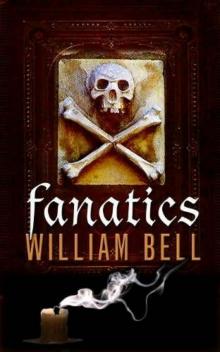 Fanatics
Fanatics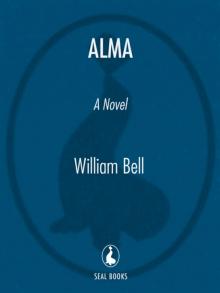 Alma
Alma Speak to the Earth
Speak to the Earth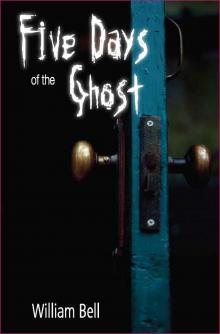 Five Days of the Ghost
Five Days of the Ghost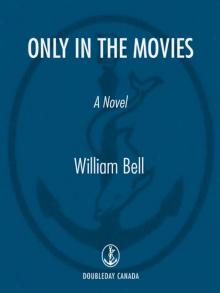 Only in the Movies
Only in the Movies Julian
Julian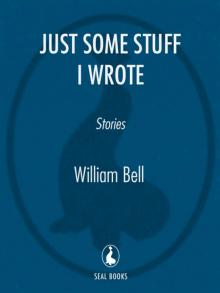 Just Some Stuff I Wrote
Just Some Stuff I Wrote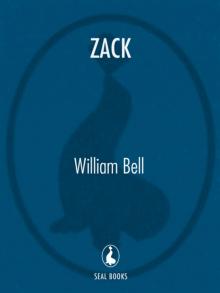 Zack
Zack Forbidden City
Forbidden City Death Wind
Death Wind No Signature
No Signature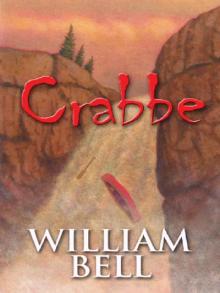 Crabbe
Crabbe